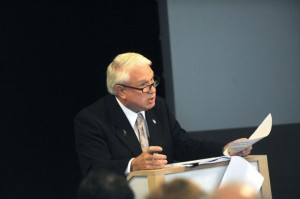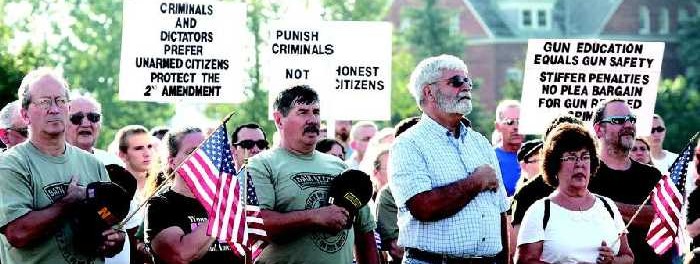
Cayuga County Sheriff David Gould speaks at the Wednesday Morning Roundtable about the New York SAFE Act at Theater Mack.
9/18/2013 • Samantha House
AUBURN | Is the SAFE Act making New Yorkers any safer? Two Cayuga County officials aren’t quite sure.
At this season’s first edition of the Wednesday Morning Roundtable, two Cayuga County officials shared their qualms with the controversial gun-regulating legislation and some suggestions about how to improve the law.
The New York Secure Ammunition and Firearms Enforcement Act of 2013 was quickly passed a few weeks after 26 people — including 20 first-grade children — were murdered during a mass shooting at Sandy Hook Elementary School in Newtown, Conn.
Speaking to an audience gathered inside Theater Mack, Sheriff David Gould said the law was passed two days after it was presented — a fast feat in a state where he said it usually takes about one year to pass each law.
“It was not done correctly,” he said. “I guarantee you they did not look it over.”
Although Gould agreed that the country needs gun reform, he said it must be done in a way that doesn’t penalize law-abiding citizens.
And the sheriff does not stand alone in his opinion. Many legislatures, including the Cayuga County Legislature, have passed resolutions asking the state to repeal the SAFE Act.
One part of the law particularly irks Gould: a SAFE Act provision that allows citizens to request the names of people who hold pistol permits. The sheriff said making permits public would lead to burglaries, and punishes people who followed the law by obtaining a permit.
So Gould does not have any intention of releasing the names of county residents with pistol permits.
“Not going to happen while I’m sheriff,” he said. “It is about the worst part of the law.”
The SAFE Act banned high-capacity magazine sales, expanded background checks and a placed more stringent restrictions on automatic weapons.
The law also required mental health professionals to report patients they deem likely to harm themselves or others to the state’s Division of Criminal Justice Service.
Ray Bizzari, Cayuga County’s mental health director, said the provision has created a cumbersome burden for people in his position.
“A lot of folks come in talking about wanting to hurt themselves or someone else,” he explained.
By speaking openly about their urges without worrying they might lose their guns, Bizzari said many patients are more willing to accept the help they need to get well. But when they get picked up by officers or lose their guns, he said patients become angry and often opt to avoid treatment.
And even though the SAFE Act only regulates guns, Bizzari said mental health professionals are required to report any threats — even if a gun isn’t mentioned.
“It’s not related to guns,” he said. “It’s related to the likelihood to harm themselves or others by any means.”
Aside from the cumbersome nature of the law, Bizzari said the SAFE Act operates under the assumption that the mentally ill are more dangerous than the general population.
“This notion that people who are ill are dangerous is inaccurate,” he said. “They’re more likely to be victims, frankly.”
So instead of passing “stupid” laws without first consulting experts, Bizzari advised that the state should instead allocate more time and resources to treating mental illness.
Gould agreed, adding that he believes smarter changes — such as lengthening sentences for defendants who use weapons — should be enacted to reduce gun violence.
“We need reform,” he said. “We need reform that doesn’t violate the Second Amendment.”
Staff writer Samantha House can be reached at (315) 282-2282 or samantha.house@lee.net. Follow her on Twitter @Citizen_House.
